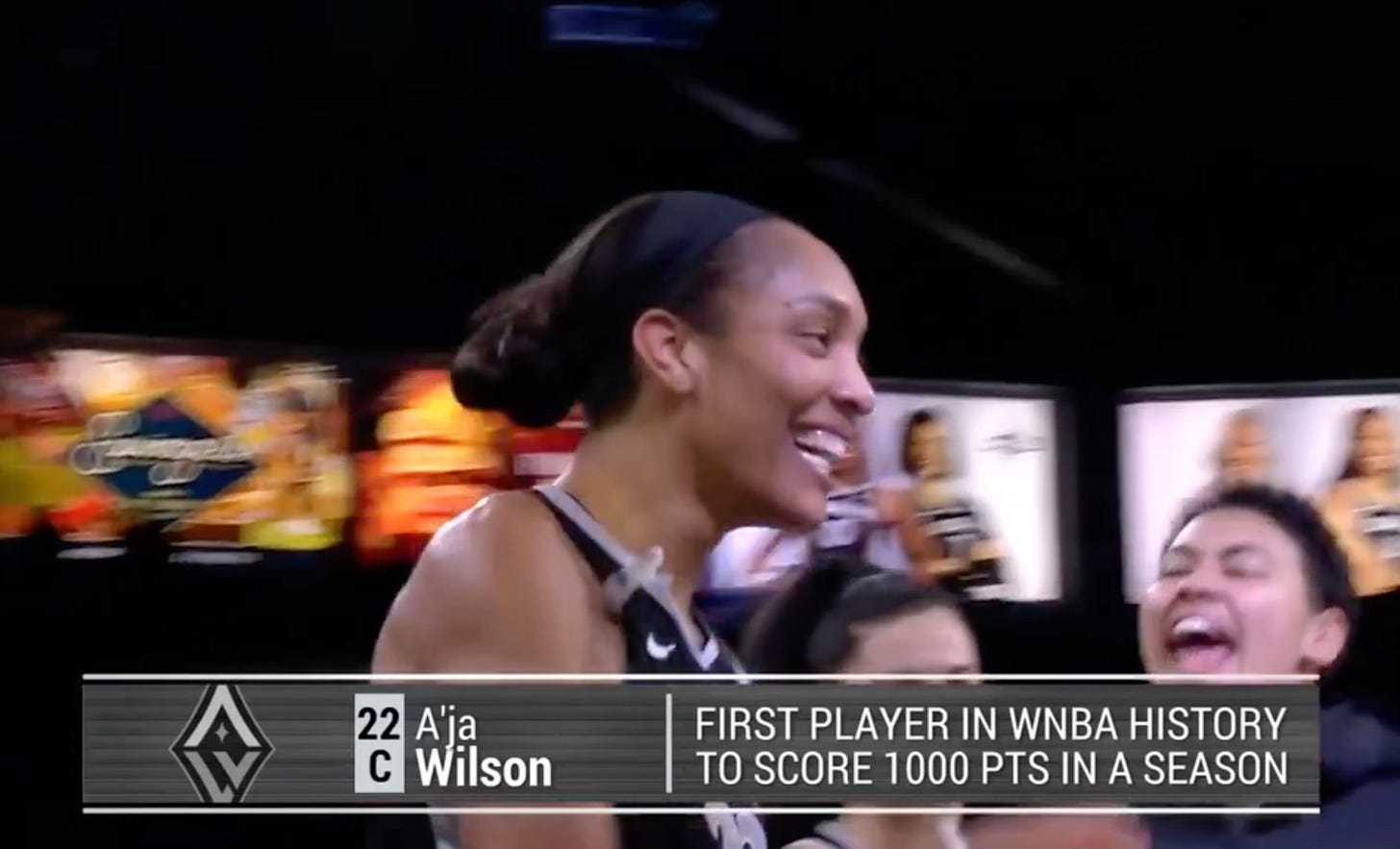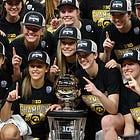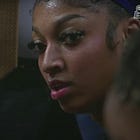As WNBA Wraps Up Its Season, Women Won, And Bigots Lost
Damn, what a great summer.

The WNBA’s last weekend is over, and no team has more than two games left to play. Seven of eight playoff teams are fixed, as are five of the eight seeds. The Seattle Storm and the two-time defending champion Las Vegas Aces are battling to see who will have home court in their inevitable 4/5 matchup while three teams — including Angel Reese’s Chicago Sky — are still in contention for the final seed with 13 wins each. But the biggest winner is literally everybody as viewership is up, attendance is up, and the quality of play has been fantastic, with records of all kinds falling here, there and everywhere, and only the bigots losing. So let’s take a moment to look back on what has made this season so special for the WNBA and for women everywhere.
Barriers fell, attention skyrocketed
Yr Wonkette has been clear for some time now that trans people are not the barrier to women’s success in sport. The biggest barriers are simply media coverage and money. And there has been great speculation for many years that maybe, just maybe, women’s sports have been ready for prime time for years now, and that if the media coverage was there, the money would naturally follow.
The first hints came five years ago when the US went wild for the Women’s World Cup soccer tournament. Four years ago basketball got a spark when Sabrina Ionescu began to post accomplishments that no man had ever touched in what basketball calls “triple doubles.” This is where a single player in a single game gets 10 each of three different stats, usually points, rebounds, and assists. It got another boost in 2021 when the internet raged at the NCAA for the blatant sexism in the difference between how it treated its women basketball finalists and its men. The Sports Bra, a Portland sports bar featuring only women’s games on the telly, opened in 2022 and began franchising in 2024.
But while all those smaller things were necessary for the later explosion, none of them can compare with the impact of Caitlin Clark, and, to a lesser extent, Reese. When the two met in the 2023 championship game, viewership spiked 87 percent over the year before. When the pair met again in the semi-final this year, 12.3 million viewers tuned in, an increase of 120 percent over the championship two years before, but this time for a non-championship game. The final game of this year’s college season grabbed 18.9 million viewers watching Clark battle against — and lose to — juggernaut South Carolina and their storied coach Dawn Staley. The men’s championship game got a respectable 14.8 million viewers, edging the Clark/Reese semis, but not close to the women’s championship.
Clark and Reese, whom Yr Wonkette has discussed before, were a genuine phenomenon. Both noted trash talkers, they sparked a necessary conversation about racism after their 2023 championship encounter when hidden prejudice became visible as the Black Reese was criticized for behavior that netted praise for the white Clark. Reese has a ring and a strong inside game, Clark has a distance shot rightly compared to the best in the NBA today paired with court vision not seen since Magic Johnson, Diana Taurasi, and Larry and Sue Bird (no relation). Together these women were so compelling that even the televised WNBA draft saw a huge spike in viewers as fans waited to hear which teams would take their favorite players.
Since the WNBA snapped up them and 34 other great athletes, the impact has been immediate and striking. From the beginning of the season the number of arena sellout games was at 2.5 times last year’s numbers with seats at 94 percent average capacity, and TV viewers of your average regular season matchups nearly tripled. The league’s sales of its streaming subscriptions more than quadrupled and merchandise sold at 8.5 times the rate of 2023. The growth has been nothing short of shocking to the people who have long belittled the women’s game, and nothing short of vindication to longtime fans who have been trying to tell broadcasters that if they wanted to provide coverage, women’s basketball has plenty of compelling storylines.
The players were fantastic
And this year’s storylines did not disappoint. Reese and Clark set numerous rookie records this year, but they didn’t limit themselves to “good for your first year.” The single season records for each of the big three basketball stats — rebounds, assists, and points — were shattered by Reese, Clark, and experienced WNBA star and defending champion A’ja Wilson. Angel Reese was up first, with a new season record for rebounds. Earlier this month she grabbed the record rebound then added a few more to finish with 446 before going out for the season with a wrist injury. Last week Clark grabbed the record for most assists in a year while Wilson broke the old scoring record of 939. But both of them have kept right on piling up accomplishments. Clark extended her lead in the assist category while also breaking the rookie points record and nabbing a personal best 35 points in a single game on Sunday. Wilson, meanwhile, continued to tear up the net, becoming the first woman ever to score 1,000 points in a season. She also is within 12 rebounds of taking Reese’s new record away. Given that she averages 12 rebounds per game and has two games left, the odds she’ll set both records in the same season are good. If she does (and maybe even if she doesn’t), the MVP award is a lock.
If you’re a fan of women’s basketball, there was nothing to leave you disappointed.
The big losers
There were losers this year, though, and the biggest ones are the biggest bigots. All year long racists have been claiming that Clark wasn’t getting the attention she was due, and that Reese was overhyped, due to Black women “owning” the WNBA and praise for white players being “cancelled.” Terrible things have been said on Twitter, but surprisingly (just kidding) the worst might actually be found somewhere else: YouTube comments.
The hatred aimed at Reese (and, at times, any Black woman who got attention that some racist thought was due Clark) was so intense that it became the subject of an apology letter from the WNBA’s president sent to every single player. The incident sparking the letter was itself a step forward of sorts, in that league president Cathy Engelbert was being interviewed on CNBC about the economics and growth of the league, something not often of interest to the business network before. While on air, Engelbert was also asked about the “dark side” of social media trash talk.
Engelbert was asked on CNBC's "Power Lunch" on Monday about the "more menacing" tone taken by some fan bases on social media, especially when race or sexuality is brought up. Engelbert focused instead on high-profile rookies Caitlin Clark of the Indiana Fever and Angel Reese of the Chicago Sky and how rivalries build fan interest.
Engelbert threw up a brick there, utterly failing to note that this is about more than rivalries or fan excitement: Reese has had to deal with stalking, death threats, AI pornography, and more — in addition to her racist, sexist former governor. But after the Player’s Association sent Engelbert a nastygram, she attempted to make good:
"I was asked a question about WNBA rivalries and the dark side of social media and race, and simply put, my answer missed the mark and I'm sorry," Engelbert wrote to the players in a letter obtained by ESPN. "I regret that I didn't express, in a clear and definitive way, condemnation of the hateful speech that is all too often directed at WNBA players on social media.”
This, of course, led to more testeria about women ballers being “woke,” but if you thought that wrung the MAGA tears dry, you sorely underestimate the amount of water that can be derived from a single snowflake.
Only hours after Engelbert’s letter became public on Friday, Clark was asked at a postgame press conference about liking Taylor Swift’s open letter to her fans encouraging them to register and to vote, and endorsing Kamala Harris and Tim Walz. Clark said that pushing people to vote was one of the most important things she could do with her public platform and that she encouraged everyone to “continue to educate yourself with the candidates that we have, the policies that they’re supporting.”
Racist bawling was immediate and loud. Shut up and dribble was a common sentiment. One instagram commenter insisted that they’d just thrown away their very real Caitlin Clark jersey. Many protested that they’d stuck up for her against the anti-white powers that be and felt betrayed.
Which, when you think about it, isn’t that different from how the racists felt when the young, white Taylor Swift that they’d imagined was on their side turned out to be woke herself.
While we still have some exciting playoff games left to come, it couldn’t be more clear that in this year’s WNBA season all the right people won, and all the right people lost. If this is what women’s pro sports brings us, all yr Wonkette can say is, “More, please!”
PREVIOUSLY!
Your friendly neighborhood Crip Dyke also writes other perverted stuff!







Testeria?
(clicks link)
"From testes, coined as a feminist response to the use of hysteria."
HA!
The racist framing wasn’t just about Reese taking attention away from Clark. It was about vulnerable white womanhood under siege from savage Black people. The same bullshit that Olympic women’s boxing went through, except without accusing Reese of being secretly a man. The message for the haters - if you’re fantasizing about Clark being so grateful for your protection that she’ll reward you with sex, you’re even more stupid than you sound.